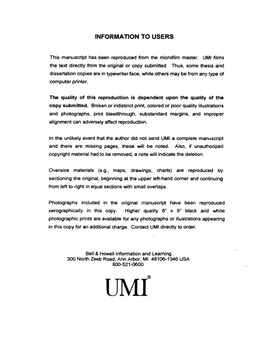| dc.contributor.advisor | Copeland, Gary W., | en_US |
| dc.contributor.author | Williams, Craig Alan. | en_US |
| dc.date.accessioned | 2013-08-16T12:18:10Z | |
| dc.date.available | 2013-08-16T12:18:10Z | |
| dc.date.issued | 2001 | en_US |
| dc.identifier.uri | https://hdl.handle.net/11244/302 | |
| dc.description.abstract | These findings emphasize the importance of interest groups and their lobbyists in congressional policymaking. They make strategic decisions to use their resources to target members in key places along the paths of policymaking, and they sometimes meet with great success. For their part, members are very aware of this courtship and sometimes choose to participate depending on a variety of variables. For political science, a major implication of these findings is the need to elevate the importance of lobbyists in the congressional policymaking arena. They are crucial actors who influence members' behavior more than the scholarship has previously proven. | en_US |
| dc.description.abstract | Both qualitative and quantitative findings lend support that the theory of legislative proxy is more than theory but reality in some cases. Quantitative models found lobbying influenced members' behavior in seven of fourteen bills studied. These findings, along with interview data, indicate that lobbyists and Members of Congress recognize that some lobby-legislator relationships in political and personal terms lend themselves to members' willing participation in the policy process on behalf of interest groups. Such participation, however, is conditional on a variety of environmental elements---including members' personal political circumstances with their district and within the policy arena of congressional committees; their policy preferences; legislative complexity; issue uncertainty; the success of lobbyists to effectively deliver their messages; and lobbyists' willingness to devote resources of time, information, and money to Members of Congress as partners to aid them in the policymaking arena. It is a conditional relationship, but it clearly exists. | en_US |
| dc.description.abstract | For the democratic process in general, these findings indicate a need to evaluate the role of lobby access and money in Congress and politics in America. Clearly access and money pay off when lobbyists successfully recruit legislative agents to shape their legislative agenda. While pluralism is at the center of American representative democracy, findings indicating the potential power of lobby access and campaign contributions raise questions regarding the democratic health of our interest group society. | en_US |
| dc.description.abstract | This dissertation tests the theory of legislative proxy that holds that interest groups' highest-order goal is to persuade Members of Congress to serve as agents, or proxies, for them in the congressional policymaking process. Current scholarship on interest groups studies group formation and maintenance and lobby goals and techniques. This literature offers, but does not fully explore, a theory that lobbyists' ultimate goal is to energize members to become their legislative agents---or proxies---within the congressional policymaking arena. This study offers a means of testing this theory using quantitative modeling and qualitative observation through three levels of analysis in the 106th Congress---tracking member participation in committee, in subcommittee, and as independent agents on fourteen bills in three committees composing 139 Members of Congress. Data sources for the research design include personal interviews with lobbyists, congressional staff, and Members of Congress, committee and subcommittee records, and various information sources about members' policy positions, district information, PAC contributions, and lobby contacts. | en_US |
| dc.format.extent | xii, 296 leaves ; | en_US |
| dc.subject | Political Science, General. | en_US |
| dc.subject | Lobbying United States. | en_US |
| dc.subject | Lobbyists United States. | en_US |
| dc.subject | Pressure groups United States. | en_US |
| dc.subject | United States. Congress. House. | en_US |
| dc.title | The making of legislative agents: Interest group influence in congressional policymaking. | en_US |
| dc.type | Thesis | en_US |
| dc.thesis.degree | Ph.D. | en_US |
| dc.thesis.degreeDiscipline | Department of Political Science | en_US |
| dc.note | Director: Gary W. Copeland. | en_US |
| dc.note | Source: Dissertation Abstracts International, Volume: 62-02, Section: A, page: 0760. | en_US |
| ou.identifier | (UMI)AAI3004895 | en_US |
| ou.group | College of Arts and Sciences::Department of Political Science | |
